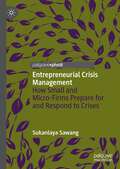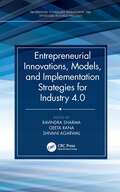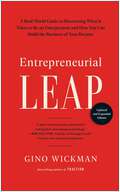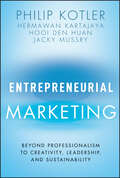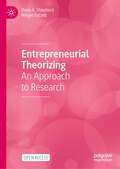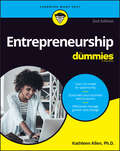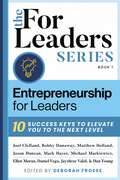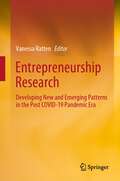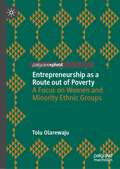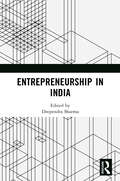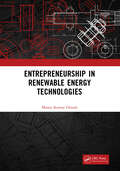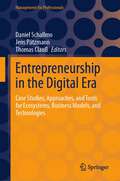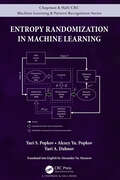- Table View
- List View
Entrepreneurial Crisis Management: How Small and Micro-Firms Prepare for and Respond to Crises
by Sukanlaya SawangThis book explores the timely issue of how small businesses, micro firms and entrepreneurs respond to crises. A largely overlooked area of research, the author posits that by better understanding crisis management in small and micro firms, we can help to protect these businesses from the potentially devastating effects of a crisis.Offering guidance for scholars and practitioners, including small business owners, to better understand the concept, limitations and considerations of crisis management - specifically in the small business context - the author demonstrates that there is no single solution for a small business to cope with a crisis. Drawing from the thematic findings, the author offers valuable recommendations on how small business owners can strategically plan for the future and better manage their capability when faced with a crisis.
Entrepreneurial Innovations, Models, and Implementation Strategies for Industry 4.0 (ISSN)
by Shivani Agarwal Geeta Rana Ravindra SharmaThis book explores the link between entrepreneurship and innovation, providing an understanding of the latest developments in the field. It explores numerous challenges to entrepreneurship, such as failures and socio-economic issues, and presents concepts, models, and implementation strategies for Industry 4.0.Industry 4.0 presents unique challenges and unique opportunities to entrepreneurs. Social, techno, and women’s entrepreneurship, among other business sectors and domains, are discussed in this new context. This book highlights the strategies of successful start-up organizations, focusing on the most critical factors for starting a new enterprise in today’s business environment, and provides efficient remedies for common problems. These strategies and solutions will help build a sustainable development model for developing economies and contribute to a global awareness of the entrepreneurship environment.Entrepreneurial Innovations, Models, and Implementation Strategies for Industry 4.0 is both a practical guide for new entrepreneurs to establishing start-ups and an enlightening collection of research for graduate students, postgraduate students, scholars, and academicians across all disciplines. Policymakers will also benefit from this book’s understanding of entrepreneurial ecosystems and their applications.
Entrepreneurial Leap, Updated and Expanded Edition: A Real-World Guide to Discovering What It Takes to Be an Entrepreneur and How You Can Build the Business of Your Dreams
by Gino WickmanYou&’ve thought about starting your own business . . . but how can you decide if you should really take the leap? An entrepreneur depends on far more than just a great idea and a generous helping of luck. There&’s a lot on the line, and you have to ask yourself difficult questions: Do I have what it takes? Is it worth it? And how the heck do I do it? You need answers, not BS. This book has them. The updated edition of Entrepreneurial Leap will help you decide, once and for all, if entrepreneurship is right for you—and give you the tools you need to create a successful business. In this three-part book, Gino Wickman, bestselling author of Traction, reveals the 6 essential traits that every entrepreneur needs in order to succeed, based on real-life stories of entrepreneurs who have reached incredible heights. If these traits ring true for you, you&’ll get a glimpse of what your life would look like as an entrepreneur, learn how to avoid 8 critical mistakes, and determine what type of business best suits your unique skill set. What&’s more, Wickman provides a detailed road map to a better start-up, including 8 must do&’s to increase your odds of success, 9 stages of building your business, and 10 disciplines for managing and maximizing your energy. Packed with tools, tips, and exercises that will accelerate your path to start-up success, Entrepreneurial Leap is a simple and practical how-to manual for BIG results. Should you take the leap toward entrepreneurship? Find out today and let tomorrow be the first step in your new journey, whatever shape it may take.
Entrepreneurial Marketing: Beyond Professionalism to Creativity, Leadership, and Sustainability
by Philip Kotler Hermawan Kartajaya Hooi Den Huan Jacky MussryAn eye-opening discussion of the future of marketing, from four of the leading minds in the field In Entrepreneurial Marketing: Beyond Professional Marketing, a renowned team of marketing leaders, including the “Father of Modern Marketing,” Professor Philip Kotler, delivers a groundbreaking and incisive redefinition of entrepreneurial marketing. In the book, some of the marketing sector’s brightest minds explore the increasingly essential initiative to build new capabilities beyond the mainstream marketing approach that also consider the effect of digital connectivity on consumers and companies everywhere. This book also discusses what marketers need to do to break the stagnation of normative marketing approaches that are often no longer effective in dealing with dynamic business environments. The authors introduce a fresh entrepreneurial marketing approach, converging dichotomies into a coherent form. The book also includes: A post-entrepreneurial-marketing view of the commercial landscape which puts the operational aspect at the center of the action, converging marketing and finance, and adopting technology for humanity Discussions of the strategies and techniques that will drive the actions of the marketing departments to create value with values that will lead the company to success through the year 2030 Explorations of the paradox between the development of core competencies and collaboration with various parties, including competitorsThe latest publication from some of the foremost minds in marketing—and in business, generally—Entrepreneurial Marketing: Beyond Professional Marketing is a must-read combination of unique insight, concrete advice, and implementable strategies that introduce a new mindset for every professional marketer, entrepreneur, and business leaders worldwide.
Entrepreneurial Theorizing: An Approach to Research
by Dean A. Shepherd Holger PatzeltThis open access book investigates an entrepreneurial approach to building new theories. It provides a rich understanding of how specific tools facilitate aspects of the theorizing process and offers a clearer big picture of the process of building important new entrepreneurship theories. The authors show that anthropomorphizing has been a critically important tool for developing influential entrepreneurship theories. They reveal how scholars build on their rich and highly accessible understanding of humans (i.e., the self and others) to make guesses and sense of entrepreneurial anomalies, articulate theoretical mechanisms to build more robust entrepreneurship theories, and create plausible stories that facilitate sensegiving. Further, they offer a framework that guides entrepreneurship scholars in finding a balance to maximize their contributions and guides reviewers and editors in managing the revise-and-resubmit process to advance the entrepreneurship field. Finally, they present lean scholarship as an approach to developing a portfolio of high-quality, high-impact papers. Lean scholarship starts with an entrepreneurial mindset and involves creating a minimum viable paper, exploring its validity, adding a plausible paper to one’s portfolio, and managing the portfolio by periodically deciding whether to persevere, pivot, or terminate each paper. This seminal work will appeal to entrepreneurship researchers, both those new to the field as well as seasoned veterans, who want to learn more about the tools that can be used to generate new knowledge about new ventures and other entrepreneurship topics.
Entrepreneurial Women in the Caribbean: Critical Insights and Policy Implications (Palgrave Studies in Equity, Diversity, Inclusion, and Indigenization in Business)
by Talia R. EsnardAdopting an intersectional lens, this book comparatively examines the multiple processes and systems of power that frame the experiences of female entrepreneurs in the Caribbean and the fluid ways in which they respond to these. Specifically, it challenges entrepreneurial scholars who are concerned with the experiences of women within that sector to critically interrogate interlocking structures of power (e.g. gender, race, class, age, industry-based hierarchies) that operate within that space, the marginalizing effects of related processes, and the extent to which these affect their thinking and practices of female entrepreneurs within the region. Through comparative lenses, the book highlights the structural and relational realities and complexities that undergird the entrepreneurial landscape within the region, the effects of these on the entrepreneurial identities, positionalities, and practices of female entrepreneurs. It underscores the many ways in which they navigate that terrain. In so doing, the book offers critical insights into the historical, socio-cultural and economic parameters within which female entrepreneurs in the region engage, the lived realities associated with these, the prospects or possibilities for re-presenting or re-framing such contextual and discursive spaces. It also provides necessary understandings of the motivations, positions, prospects, possibilities and constrains of entrepreneurial women in the region and the policy implications of these realities. This book offers insights for scholars and policymakers that are important for (i) understanding the current gaps in entrepreneurial research and policy, (ii) the tools, methods, and strategies that are needed to address these contextual and discursive realities, and ultimately, (iii) the ways in which policy makers and local governments can promote the authentic empowerment of female entrepreneurs in the region, while giving considerations to precarious realities of women.
Entrepreneurship
by Brenda Clark Judy CommersEntrepreneurship introduces students to the risks and rewards of business ownership with a project-based pedagogy and a foundation in economic concepts. Students are guided through the elements and creation of a business plan, using a step-by-step narrative for selecting an idea for a business, social and ethical responsibilities, start-up options for the new business, operating the business, and expanding and exiting the business. The third edition reflects current business concepts such as trade agreements and trade barriers, the promotional mix, and insurance practices.
Entrepreneurship Business Debates: Multidimensional Perspectives across Geo-political Frontiers
by Vanessa RattenThis book introduces entrepreneurship as a concept that is popular in the general media but also in academic study. What is evident is due to its positive and negative connotations in society. This book identifies that it is important to debate the topic of entrepreneurship in order to understand its multi-faceted nature. This edited book includes a number of chapters that discuss multidimensional perspectives from an international perspective. This book emphasizes the geo-political frontiers related to entrepreneurship based on current debates, which includes recent global changes.This book also challenges the debatable as to whether entrepreneurship should be examined at the individual, firm, regional, or industry level. This book goes further to demonstrate that this depends on the type and nature of the study. Therefore, it is better to consider entrepreneurship in a multidimensional way that incorporates different levels of analysis.This book shows each level of analysis that can be considered from a geo-political perspective. This means including an overview of the cultural factors that influence entrepreneurial behavior. In this way, this book helps readers to understand how and why geography and politics influence entrepreneurial action.
Entrepreneurship For Dummies
by Kathleen AllenThe perfect resource for your journey to start a business Entrepreneurship For Dummies is the essential guide to becoming your own boss and a successful entrepreneur. We make it simple to learn every step of the process. Identify an opportunity, learn your customers’ needs, test your product, protect your intellectual property, secure funding, and get ready for that all-important launch. In classic Dummies style, this book is packed with practical information and useful advice, all in a fun and easy-to-follow format. Take fear out of the entrepreneurship equation and build the confidence you need to make your fantastic business idea take flight. Get up to date on the latest lingo, new ideas for raising money, and the latest ways to do business in the digital age. Understand the process of starting a business, from beginning to end Complete the necessary planning and meet legal requirements, without the headache Get expert tips and tricks on funding your idea and bringing your product or service to market Build the foundation you need to keep your business thriving and growingEntrepreneurship For Dummies supports you as you travel along the road to success.
Entrepreneurship For Leaders: 10 Success Keys To Elevate You To The Next Level (For Leaders Series)
by Young Hayes Duncan Holland Clelland Dunaway Markiewicz Moran Vega VakilWhat does it actually take to become an entrepreneur? In this first book of the For Leaders Series from Indigo River Publishing, ten successful serial entrepreneurs share their perspectives of risk-taking and business building. From crushing fear to creating global impact, this book will give you insights and tools for your journey.Entrepreneurship For Leaders features a dynamic range of contributors: Joel Clelland, Bobby Dunaway, Jason Duncan, Mark Hayes, Matthew Holland, Michael Markiewicz, Ellen Moran, Daniel Vega, Jayshree Vakil and Dan Young. With more than several dozen start-ups between them, they address common experiences and essential skills: Learn when and how to delegate. Discover the right kind of passion to drive success. Understand the factors that distinguish entrepreneurs from employees. Capitalize on the leadership styles of your team members. Position your business for the best tax advantage. Nurture the right kind of energy within yourself and your organization. Create and maintain healthy relationships for a stronger, more impactful presence. An engaging read, Entrepreneurship is sure to spark new perspectives and ideas for expanding your entrepreneurial experience.
Entrepreneurship Research: Developing New and Emerging Patterns in the Post COVID-19 Pandemic Era
by Vanessa RattenThis book explores how the COVID-19 pandemic has changed entrepreneurial business practices and policies. The role of digitalization and de-internationalisation as part of entrepreneurial business thinking is discussed in this book as a way of keeping track with new research avenues. Due to the fundamental way the COVID-19 pandemic shocked and surprised entrepreneurs, it becomes important to develop new business patterns. The discussion in this book centres on the question: how has business practices changed in the post-COVID-19 era and what needs to be learnt? Each chapter in this edited book presents a different way to understand these changes and make sense of alterations in the global business environment, thereby ensuring that business academics, policy makers and practitioners are kept abreast of changes. Whilst there have been books on the COVID-19 pandemic, this book goes a step further by presenting new research into the post-COVID-19 pandemic era that is of a recent nature. This means it is amongst the first edited book to focus on patterns in terms of business marketing and management that have an entrepreneurial nature. This is helpful to gain a better nuanced and detailed understanding about the implications that are ongoing and future orientated arising from the COVID-19 pandemic.
Entrepreneurship and Innovation in Sport and Leisure
by Simon Mosey Richard Shipway Chris SymonsThis innovative textbook explains how sport and leisure organisations can become more entrepreneurial in order to achieve sustainable growth. It introduces key tools, techniques, and approaches that can help sport and leisure organisations put entrepreneurship at the centre of their culture. Drawing on cutting-edge research, innovation discourses, and perspectives from multiple disciplines, the book introduces fundamental concepts in entrepreneurship, innovation, and enterprise, such as digitalisation, research and development (R&D), diversification, extendibility, and sustainability. It highlights future innovation challenges, provides innovative solutions, and introduces a new diagnostic tool for managing entrepreneurship and innovation. The book presents insights on everyday management challenges from experienced industry practitioners and considers the importance of social enterprise and social entrepreneurship at a time of austerity, recession, and increasing uncertainty. Full of real-world cases and scenarios, as well as useful features to encourage critical reflection, this book is essential reading for any course on entrepreneurship taken as part of a degree course in sport management leisure, sports studies, recreation, event studies, entertainment management or tourism. It is also fascinating reading for practitioners looking to improve their professional skills.
Entrepreneurship and Universities: Pedagogical Perspectives and Philosophies
by Robert James CrammondThe presence of enterprising activity, which now permeates universities globally, leaves a notable legacy and impact on both individuals and institutions. This book explores the universal and growing relationship between entrepreneurship and higher education. Beginning with a general introduction to entrepreneurship education-related applications of pedagogy and educational philosophy, the book goes on to discuss institutional and stakeholder relevancy, followed by the cultural impact of entrepreneurship. In doing so, the book highlights the multifaceted nature of embedded entrepreneurship within institutions pedagogically, philosophically, socially, and structurally. Acknowledging several perspectives of entrepreneurship, the author addresses the core questions for higher education, reflects on thematic case studies concerning enterprise and entrepreneurship within the sector, and presents a new model for university-based entrepreneurship across teaching, research, and business development activities.
Entrepreneurship and Well-being: Exploring the UN Sustainable Development Goals through the lenses of GEM and other indicators (Sustainable Development Goals Series)
by Slavica Singer Nataša Šarlija Miroslav Rebernik Barbara Bradač HojnikContributing to the targets of SDG #17, this book interrogates how the Global Entrepreneurship Monitor (GEM) and other indicators are (or can be) relevant for entering the global discussion on UN SDGs. By highlighting the topic of 'well-being' as a major connecting point between the SDGs, the GEM and other surveys the book has three main purposes: firstly, it shows that GEM data can contribute significantly to the monitoring process of the attainment of the Sustainable Development Goals; secondly it analyses the survey’s capacity to add value to the global discussion on well-being; thirdly, the book places emphasis on the pressing need for data in order to monitor the achievement of the SDGs. Ultimately, the book provides sound research that can serve as a basis for discussion with the UN on potential partnerships within the framework of SDG 17. The authors encourage GEM and other researchers to ensure that their data serves as a reliable partner to the UN in building a better world, based on well-being for everyone.
Entrepreneurship as a Route out of Poverty: A Focus on Women and Minority Ethnic Groups
by Tolu OlarewajuThis book examines how entrepreneurship can be used as a tool to escape poverty. With relevance for both SDG 1: ‘No Poverty,’ and SDG 8: ‘Promote sustained, inclusive and sustainable economic growth, full and productive employment and decent work for all,’ it pays special attention to women and minority ethnic groups. Offering a fresh perspective on entrepreneurship as a means of upward social mobility and rooted in research, the book explores the issue in three ways. Firstly, it pays special attention to the nexus between the entrepreneur, resources, institutions, opportunities, necessities, and the environment for drawing a comprehensive picture of how individuals could use entrepreneurship for successful upward social mobility in a changing world. Secondly, it emphasizes the peculiar challenges that female entrepreneurs face, how those challenges can be overcome, and how female entrepreneurship may be a route to women’s socio-economic advancement. Thirdly, it highlights the challenges faced by ethnic minority business owners and how such ethnic minority businesses could thrive amid institutional voids as well as direct and indirect forms of discrimination. Based on the latest research from developed and developing countries, the book offers compelling insights for sustaining entrepreneurial ventures in an evolving world.
Entrepreneurship der Zukunft: Voraussetzung, Implementierung und Anwendung von Künstlicher Intelligenz im Rahmen datenbasierter Geschäftsmodelle
by Sebastian Gerth Lars HeimDieses Buch behandelt die Rolle von Künstlicher Intelligenz (KI) im Kontext der fortlaufenden Digitalisierung und Automatisierung in Unternehmen, um Wertschöpfung zu optimieren, neue Geschäftsmodelle zu entwickeln oder bestehende zu transformieren. Untersucht werden Voraussetzungen, Implementierung und Anwendung von KI in datenbasierten Geschäftsmodellen und dabei sowohl Chancen als auch Risiken beleuchtet.Der erste Buchabschnitt konzentriert sich auf die erforderlichen Bedingungen für den erfolgreichen Einsatz von KI. Hierzu zählen die Erfassung und Verarbeitung von Daten, der Aufbau einer robusten IT-Infrastruktur und die Personalschulung. Im zweiten Abschnitt wird die Implementierung von KI diskutiert. Besonderer Fokus liegt dabei auf dem Aufbau und Training von KI-Systemen und deren Integration in bestehende Geschäftsprozesse. Verschiedene Ansätze der KI, wie Machine Learning und Deep Learning, werden erläutert und ihre Anwendungsmöglichkeiten aufgezeigt. Der dritte Abschnitt widmet sich der praktischen Anwendung von KI in verschiedenen Branchen und Geschäftsmodellen. So werden etwa Beispiele aus der Produktion, dem Handel und der Dienstleistungsbranche vorgestellt, um den Einsatz von KI zur Automatisierung von Prozessen, Optimierung von Entscheidungen und Verbesserung von Prognosen zu demonstrieren.Insgesamt bietet das Buch eine umfassende Perspektive auf das Thema KI und liefert in 17 Kapiteln wertvolle Anregungen für Unternehmen, um ihre Zukunftsfähigkeit mit KI zu sichern und von den Möglichkeiten zu profitieren. Die Beiträge von führenden Expert:innen aus unterschiedlichen Disziplinen, mit verschiedenen theoretischen Ansätzen, methodischen Zugängen und empirischen Befunden beleuchten und diskutieren das Thema sehr anschaulich.
Entrepreneurship in India
by Deependra SharmaThis book introduces readers and students to the entrepreneurial process. It is important as evidence has suggested that the probability of entrepreneurs’ success enhances when they thoroughly appreciate the components of the entrepreneurial process as well as how to effectively use them. The fact that nearly 33 percent of new firms fail within the first two years while twenty percent fail within four to five years of their existence makes it evident that while many people are highly motivated to start new firms, motivation alone is not sufficient, rather it should be coupled with relevant information, a strong business idea, a well-crafted business plan, and sound execution to maximize chances for success. This work offers an insightful and a practical guide to the process of launching and growing an entrepreneurial organisation with success. It will therefore serve as an important resource to students of Entreprenuership and to anyone interested in the field, academically or practically.
Entrepreneurship in Renewable Energy Technologies
by Manoj Kumar GhosalThis book focusses on various options of taking up ventures for starting entrepreneurship in small/large scale in the field of renewable energy technologies. The book covers the fundamentals of entrepreneurship, renewable energy resources, their technologies involved and applications along with financial evaluations. The book will cater to the needs of students, researchers, various stakeholders, entrepreneurs etc. by providing valuable information on renewable energy technologies and their applications in developing entrepreneurship and establishing enterprise at individual level, specifically focusing on low carbon technology for sustenance of environment which is becoming increasingly important.
Entrepreneurship in a Time of Social Justice Advocacy
by James O. FietThis book offers a critique of social justice theory and its impact on entrepreneurship scholarship. It traces its deep roots in postmodernism by positioning entrepreneurship within these new intellectual, social, and economic environments. It highlights current philosophical assumptions, with implications for boundary conditions that we apply as scientists. Science depends on theoretical assumptions and boundary conditions. Unfortunately, a glaring weakness in entrepreneurship research has been its general failure to identify these premises. No theory is universally applicable, so its assumptions and boundary conditions are what give it analytical power. Where do they come from? Simply stated, they come from a theory's philosophy of science. However, even more rare than stating assumptions and boundary conditions is to discuss a study's governing philosophy. In fact, no known research published in entrepreneurship has discussed a study's philosophical orientation. This provocative work details postmodern concerns related to critical theory, their origins, their status, and specifically how they impact entrepreneurship and those who are not designated as either the victimized or part of the white patriarchy. It will challenge the current direction of entrepreneurship research and confront the general acceptance of the tenets of postmodernism among management scholars.
Entrepreneurship in the Creative Industries: How Innovative Agents, Skills and Networks Interact
by Susan Kerrigan Phillip McIntyre Janet Fulton Michael MeanyThis books provides a critical perspective on entrepreneurialism in the creative industries. Split into three sections, the book first asks the contextual question; why, at this point in time, did we arrive at such a focus on entrepreneurship in the creative industries? Examining the historical, social, cultural, economic and political background, the book places the creative industries and entrepreneurship firmly within a systemic approach to creativity and cultural production. Given this emphasis on entrepreneurship in the creative system, the second part of the book asks, what do those who want to work in the creative industries need to do to pragmatically gain an income? The practices, skills, business models and plans necessary to master in order to successfully run a business are explored in this section. The final section contains detailed case studies that reveal the lives of those who found a way to successfully gain an income in the creative industries. It highlights the practical knowledge they gathered, how they negotiated their field of endeavour, and the decisions they made in the real world.Fundamentally the book answers three questions: How and why did we get here? Given that we are here at this point in time, how do we go about being entrepreneurial? And who has managed to do this in the creative industries and how did they do it? Covering both theoretical debates in detail, and practical case studies in key sub-sectors of creative industries, this truly integrative and far-reaching volume will be of interest to students, researchers and practitioners alike.
Entrepreneurship in the Digital Era: Case Studies, Approaches, and Tools for Ecosystems, Business Models, and Technologies (Management for Professionals)
by Thomas Clauß Daniel Schallmo Jens PätzmannChanges in the environment such as trends, drivers, and influencing factors affect entrepreneurship and intrapreneurship in several ways. The changes of the environmental factors in several dimensions such as political, economic, socio-cultural, technological, ecological, and legal. On the one hand, the environmental changes include risk for existing business models. On the other hand, they include opportunities for new business models, entrepreneurship, intrapreneurship, and new insights in marketing. This book provides empirical and conceptual papers and studies that tackle the challenges and opportunities for entrepreneurship in the digital era. It offers professionals, managers, researchers, lecturers, and students from the fields of entrepreneurship, innovation management, and business development valuable insight into the topic of entrepreneurship in times of digitalization.
Entropy Randomization in Machine Learning
by Yuri S. Popkov Alexey Yu. Popkov Yuri A. DubnovEntropy Randomization in Machine Learning presents a new approach to machine learning—entropy randomization—to obtain optimal solutions under uncertainty (uncertain data and models of the objects under study). Randomized machine-learning procedures involve models with random parameters and maximum entropy estimates of the probability density functions of the model parameters under balance conditions with measured data. Optimality conditions are derived in the form of nonlinear equations with integral components. A new numerical random search method is developed for solving these equations in a probabilistic sense. Along with the theoretical foundations of randomized machine learning, Entropy Randomization in Machine Learning considers several applications to binary classification, modelling the dynamics of the Earth’s population, predicting seasonal electric load fluctuations of power supply systems, and forecasting the thermokarst lakes area in Western Siberia. Features • A systematic presentation of the randomized machine-learning problem: from data processing, through structuring randomized models and algorithmic procedure, to the solution of applications-relevant problems in different fields • Provides new numerical methods for random global optimization and computation of multidimensional integrals • A universal algorithm for randomized machine learning This book will appeal to undergraduates and postgraduates specializing in artificial intelligence and machine learning, researchers and engineers involved in the development of applied machine learning systems, and researchers of forecasting problems in various fields.
Entropy and the Second Law of Thermodynamics: ... or Why Things Tend to Go Wrong and Seem to Get Worse
by Robert FleckThis book is a brief and accessible popular science text intended for a broad audience and of particular interest also to science students and specialists. Using a minimum of mathematics, a number of qualitative and quantitative examples, and clear illustrations, the author explains the science of thermodynamics in its full historical context, focusing on the concepts of energy and its availability and transformation in thermodynamic processes. His ultimate aim is to gain a deep understanding of the second law—the increase of entropy—and its rather disheartening message of a universe descending inexorably into chaos and disorder. It also examines the connection between the second law and why things go wrong in our daily lives. Readers will enhance their science literacy and feel more at home on the science side of author C. P. Snow's celebrated two-culture, science-humanities divide, and hopefully will feel more at home in the universe knowing that the disorder we deal with in our daily lives is not anyone's fault but Nature's.
Entry Level Skill Checklists for Physical Therapist Assistant Students (Core Texts for PTA Education)
by Terry LarsonA new resource to support and track student development across PTA programs, Entry-Level Skill Checklists for Physical Therapist Assistant Studentsis a visually appealing lab manual that includes entry-level PTA skills in a user-friendly, step-by-step checklist format.Written by seasoned PT and PTA instructor Dr. Terry Larson, Entry-Level Skill Checklists for Physical Therapist Assistant Studentscombines skill and evaluation measures into checklists so instructors may track their students’ progress with ease. The book is meant to follow students throughout their programs of study—from their first lab course to submission at the end of their program. Created to reflect the Commission on Accreditation in Physical Therapy Education guidelines, Entry-Level Skill Checklists for Physical Therapist Assistant Studentsis the latest entry into SLACK Books’ Core Texts for PTA Education series.What’s included in Entry-Level Skill Checklists for Physical Therapist Assistant Students: Sections on data collection and intervention Checklists following each skill stage to record and evaluate progress Checkboxes for peer evaluation and instructor assessment Comment areas for instructors to provide feedback on development of student abilities Across courses and programs, Entry-Level Skill Checklists for Physical Therapist Assistant Students will help students facilitate self-evaluation and professors gauge and document student progress in any PTA program.
Entrégala a la bestia: Cómo la magia negra me arrastró al infierno, y el doloroso camino a mi sanación: Una historia real
by Marcela SolanaEl dolor en el cuerpo era insoportable, la hinchazón en las manos y las piernas iban acompañadas de ardor extremo, náuseas, sudoración y vómito: los efectos espantosos de la magia negra. Este libro no es producto de la fantasía, es una historia horriblemente cierta que detalla todo lo que una mujer soportó por un trabajo de brujería. Valiente, decidida, Marcela Solana cuenta cómo desde muy pequeña sufrió los accidentes mortales más inexplicables, hasta que en la adolescencia y juventud la magia negra estalló en su cuerpo, le produjo hematomas dolorosos, le robó el sueño y le destrozó la digestión, la hundió en profundas depresiones y le heló la sangre al revelarle lo que jamás imaginó. En Entrégala a labestia la autora cuenta cómo descubrió que un miembro ambicioso y malvado de su familia más cercana no sólo quería destruirla a ella, detalla cómo entre chamanes, médiums y videntes coincidieron en que estaba embrujada, cómo se transformó su cuerpo hasta sentirse desgastado y frágil, y el lento, doloroso y trágico camino a la sanación. La obra no es sólo un recuento de todos los horrores que desencadena la brujería más potente, es también el relato de una lucha a muerte contra el mal para alcanzar la luz y la esperanza.
